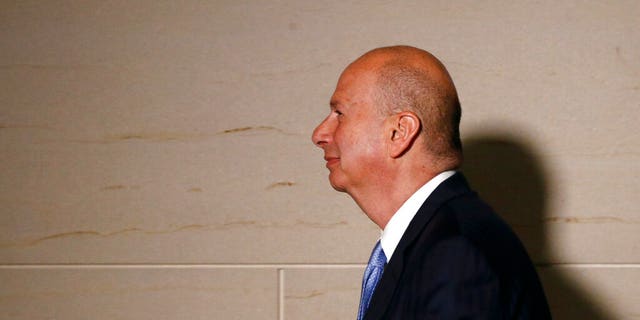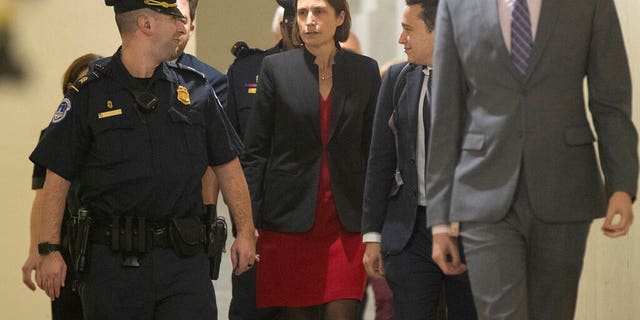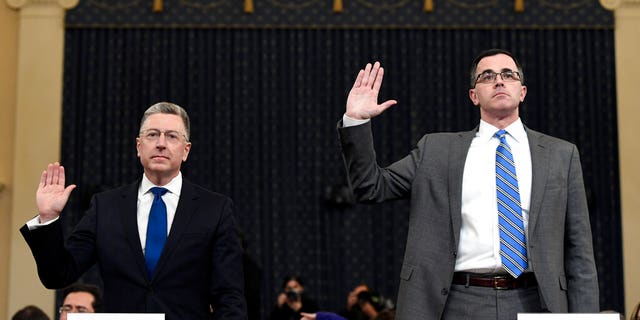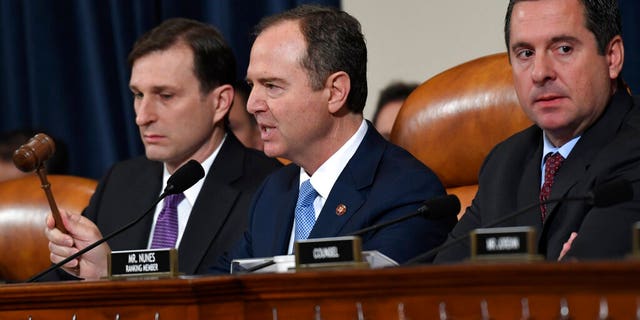In a conspicuous moment during Tuesday's impeachment inquiry hearings, former National Security Council aide Tim Morrison testified that one of his colleagues urgently warned him about President Trump’s European Union ambassador, Gordon Sondland, and even coined a name for her concerns: “the Gordon problem.”
On Wednesday morning, it'll be Sondland's turn to testify as the impeachment probe's most anticipated witness, less than 24 hours after Republicans declared total victory in Tuesday afternoon's hearings. But it remained unclear whether the wealthy hotelier-turned-diplomat would pose a "problem" for Democrats, Republicans, or all of the above.
Sondland is more directly entangled than any witness yet in the president’s alleged efforts to get Ukraine to investigate former Vice President Joe Biden's dealings in the country, including Biden's successful push to have Ukraine's top prosecutor fired by threatening to withhold $1 billion in U.S. aid. Yet Sondland has already amended his testimony once -- “I now do recall,” he said, talking to Ukraine about anti-corruption investigations — and has frustrated Democrats' efforts to build a consistent narrative of misconduct by the president.
Most notably, Sondland previously testified behind closed doors that Trump directly told him there were to be "no quid pro quos of any kind" with Ukraine, and that he didn’t recall any conversations with the White House about withholding military assistance in return for Ukraine helping with the president’s political campaign.

FILE - In this Monday, Oct. 28, 2019, file photo, U.S. Ambassador to the European Union Gordon Sondland walks to a secure area of the Capitol to testify as part of the House impeachment inquiry into President Donald Trump, in Washington. Sondland is scheduled to be the first witness when the impeachment hearings resume at 9 a.m. EST Wednesday, Nov. 20. (AP Photo/Patrick Semansky, File)
Then, William Taylor, the U.S. chargé d'affaires for Ukraine, told lawmakers that Sondland himself said "everything" — a White House visit for Ukraine's new leader and the release of military aid to the former Soviet republic — was contingent on a public announcement of investigations into the 2016 election and into Ukraine gas company Burisma Holdings. (Hunter Biden held a highly lucrative role on the board of Burisma, despite having little relevant experience, while his father oversaw Ukraine policy as vice president.)
Weeks later, after testimony from Taylor and Morrison placed him at the center of key discussions, Sondland amended his testimony and claimed his recollection had been "refreshed." Sondland said he now could recall a September conversation in which he told an aide to Ukraine President Volodymyr Zelensky that military aid likely would not occur until Ukraine made public announcements about corruption investigations. Sondland said he came to "understand" that arrangement from other sources.
Additionally, Sondland has insisted he knew acting White House Chief of Staff Mick Mulvaney only well enough to wave and say hello. He said he may have spoken to him once or twice on the phone, but not about Ukraine. Meanwhile, Lt. Col. Alexander Vindman, an NSC official, has testified Sondland cited a discussion with Mulvaney when pushing Ukrainian officials to open the investigations that Trump wanted into alleged 2016 U.S. presidential election interference and the Bidens.
Separately, Fiona Hill, another White House national security official, said Sondland often talked of meetings with Mulvaney. In a further link between the two men, she quoted the-then National Security Adviser John Bolton as telling her he didn’t want to be part of “whatever drug deal Sondland and Mulvaney were cooking up.” Hill is to testify Thursday.
Trump, meanwhile, has recently tried to suggest that he barely knows his hand-picked ambassador, but Sondland has said he has spoken several times with the president and was acting on his direction. Sondland routinely bragged about his proximity to Trump and drew alarm from the foreign service and national security apparatus as part of an irregular channel of diplomacy led by the president’s lawyer, Rudy Giuliani.

Oct. 14: Former White House advisor on Russia, Fiona Hill, leaves Capitol Hill in Washington. (AP)
Last week, State Department official David Holmes revealed one of Sondland's interactions with Trump, saying he recalled it “vividly.”
The political counselor was having lunch with Sondland in Kiev when the ambassador dialed up the president on his cell phone and Holmes could hear Trump’s voice.
“I then heard President Trump ask, quote, ‘So he’s going to do the investigation?’” Holmes testified. “Ambassador Sondland replied that ‘He’s going to do it,’ adding that President Zelensky will, quote, ‘do anything you ask him to.’”
Holmes testified that he told "a number of friends of mine" about the call because it was "like, a really extraordinary thing" to be "part of" a lunch in which "someone called the president." He insisted he didn't go into detail about the call while he boasted about it, but estimated that he may have told as many as six friends.
Sondland was known for telling others "he was in charge of Ukraine" despite being the U.S. envoy in Brussels, Hill testified. (Trump campaign officials have noted that several Democrat witnesses appeared to suggest that they were in charge of Ukraine policy, not the president.)
"And I asked, well, on whose authority?” said Hill. "And he said, the president."
Also testifying on Wednesday are Pentagon official Laura Cooper and Under Secretary of State for Political Affairs Hale.
Their appearances will follow the testimony Tuesday of four national security and diplomatic officials, including two GOP witnesses -- Morrison and former U.S. Special Representative for Ukraine Kurt Volker -- who largely undercut Democrats' primary arguments for impeachment.
Both Volker and Morrison repeatedly denied that there was any bribery or extortion by the president in his call with Zelensky. Their answers underscored a problem facing House Democrats as their impeachment inquiry continued into its second week of public hearings: With more witnesses testifying, more soundbites have emerged that may help Republicans and the Trump campaign argue that the proceedings were politically motivated theater, long in the works and foreshadowed openly by Democrats for months, if not years.
"Ambassador Volker, I presume you got a readout of the call," Rep. Elise Stefanik, R-N.Y, asked at one point. "Was there any reference to withholding aid? Any reference to bribery? Any reference to quid pro quo? Any reference to extortion?"
"No, there was not," Volker replied, again and again.
Shortly after that moment, President Trump tweeted, "A great day for Republicans, a great day for our Country!"
"Kind of hard to prove a corrupt quid pro quo theory when the key U.S. policy people, plus the Ukrainians, were never aware of such an arrangement," Texas GOP Rep. Dan Crenshaw added late Tuesday, noting that Ukraine's president has said he felt no pressure from Trump to open any probes. "Can we go back to governing now, that’d be great thanks."
Ohio GOP Rep. Jim Jordan told Fox News, "This was a very good day for Republicans, for our president."
However, Volker did help some aspects of House Democrats' case. He shifted his own account of a July 10 White House meeting to say Sondland did, in fact, discuss investigations with the visiting Ukrainians. “I think all of us thought it was inappropriate; the conversation did not continue and the meeting concluded,” Volker said.
Volker said Sondland had raised the idea of investigations “in a generic way," and that Bolton immediately ended the meeting.
A series of text messages Volker provided to lawmakers showed conversations between him, Sondland and other leaders in which they discussed a need for Ukraine to launch investigations, including into Burisma Holdings. Volker also said he didn't initially realize the connection between a Trump-sought investigation of Burisma and the Bidens,
Volker went on to testify that during a September dinner with top Ukrainian official Andriy Yermak, he’d discouraged Ukraine from trying to prosecute the country’s previous president. Volker says he warned it would sow deep societal divisions.

Ambassador Kurt Volker, left, former special envoy to Ukraine, and Tim Morrison, a former official at the National Security Council are sworn in to testify before the House Intelligence Committee on Capitol Hill in Washington, Tuesday, Nov. 19, 2019, during a public impeachment hearing of President Donald Trump's efforts to tie U.S. aid for Ukraine to investigations of his political opponents.
Volker said Yermak quipped in response, “You mean like asking us to investigate Clinton and Biden?” Volker claimed he didn’t “quite understand” the head-turning remark and was “kind of puzzled” by it.
Burisma had been under investigation before then-Vice President Joe Biden pressured Ukraine to fire the prosecutor in charge. In his call with Zelensky, Trump suggested the Ukrainians look into the circumstances of the prosecutor's termination, including Joe Biden's boast that he had the prosecutor fired by threatening to withhold $1 billion in critical aid.
Another witness who testified earlier Tuesday was a career Army officer who described Trump’s call with Zelensky as “improper.”
"Frankly, I couldn’t believe what I was hearing," he testified. "In certain regards, my worst fear of how our Ukraine policy could play out was playing out."

House Intelligence Committee Chairman Adam Schiff, D-Calif., center, flanked by House Democratic Counsel Daniel Goldman, left, and ranking member Devin Nunes, R-Calif., uses his gavel as former U.S. Ambassador to Ukraine Marie Yovanovitch testifies before the House Intelligence Committee on Capitol Hill in Washington, Friday, Nov. 15, 2019. (AP Photo/Susan Walsh)
Vindman told lawmakers it was his “duty” to report his concerns about the call, as he deflected Republican attacks, including from the White House on his loyalty and career in public service.
It wasn’t the first time Vindland had registered his concerns over Ukraine policy. He testified about the July 10 meeting at the White House when Sondland told visiting Ukraine officials they would need to “deliver” before the administration would agree to a meeting Zelenskiy wanted with Trump.
“Ambassador Sondland referred to investigations into the Bidens and Burisma in 2016,” Vindman testified.
However, Vindman was caught in an apparent contradiction late in the day by Republican Ohio Rep. Brad Wenstrup. Vindman testified earlier in the day that he did not discuss his concerns about Trump's July phone call with Morrison, his superior, because he was unavailable.
Under questioning from Wenstrup, Morrison confirmed that Vindman had given him edits of the transcript of the call, on the same day that Vindman testified Morrison was unreachable.
Arizona GOP Rep. Paul Gosar offered a blunt assessment of Vindman's testimony, tweeting: "I think people need a reminder: the democrats said they would impeach starting in December 2016–before @realDonaldTrump was even sworn in. This is a hearing looking for a reason. It’s corrupt and immoral. The dude in the uniform is a seditionist."
Morrison, meanwhile, also said he had heard others express concern that Vindman was a leaker, and could not be trusted with key information. Asked about that allegation, Vindman read from a glowing performance review that described him as an exemplary officer.
In a particularly remarkable moment, Vindman testified that he was asked to serve as Ukraine’s defense minister three times -- but repeatedly denied the offers -- when he traveled to Kiev for the inauguration of Ukraine's president. Oleksander Danylyuk, the former Chairman of the National Security and Defence Council in Ukraine, reportedly said on Tuesday the offer was "clearly a joke."
At the White House, Trump said he had watched part of the day’s testimony and slammed the ongoing impeachment hearings as a “disgrace.” Over the weekend, Trump assailed Vice President Pence aide Jennifer Williams as part of the “Never Trumpers” who oppose his presidency, though there is no indication she has shown any partisanship. Williams was critical of Trump's call with Zelensky.
However, in his testimony, Morrison suggested the impeachment brouhaha was predictable partisan politics as usual.
"I feared at the time of the call on July 25th how its disclosure would play in Washington's political climate," Morrison said in his opening statement on Tuesday. "My fears have been realized."
On Wednesday morning, it'll be Sondland's turn to testify as the impeachment probe's most anticipated witness, less than 24 hours after Republicans declared total victory in Tuesday afternoon's hearings. But it remained unclear whether the wealthy hotelier-turned-diplomat would pose a "problem" for Democrats, Republicans, or all of the above.
Sondland is more directly entangled than any witness yet in the president’s alleged efforts to get Ukraine to investigate former Vice President Joe Biden's dealings in the country, including Biden's successful push to have Ukraine's top prosecutor fired by threatening to withhold $1 billion in U.S. aid. Yet Sondland has already amended his testimony once -- “I now do recall,” he said, talking to Ukraine about anti-corruption investigations — and has frustrated Democrats' efforts to build a consistent narrative of misconduct by the president.
Most notably, Sondland previously testified behind closed doors that Trump directly told him there were to be "no quid pro quos of any kind" with Ukraine, and that he didn’t recall any conversations with the White House about withholding military assistance in return for Ukraine helping with the president’s political campaign.

FILE - In this Monday, Oct. 28, 2019, file photo, U.S. Ambassador to the European Union Gordon Sondland walks to a secure area of the Capitol to testify as part of the House impeachment inquiry into President Donald Trump, in Washington. Sondland is scheduled to be the first witness when the impeachment hearings resume at 9 a.m. EST Wednesday, Nov. 20. (AP Photo/Patrick Semansky, File)
Then, William Taylor, the U.S. chargé d'affaires for Ukraine, told lawmakers that Sondland himself said "everything" — a White House visit for Ukraine's new leader and the release of military aid to the former Soviet republic — was contingent on a public announcement of investigations into the 2016 election and into Ukraine gas company Burisma Holdings. (Hunter Biden held a highly lucrative role on the board of Burisma, despite having little relevant experience, while his father oversaw Ukraine policy as vice president.)
Weeks later, after testimony from Taylor and Morrison placed him at the center of key discussions, Sondland amended his testimony and claimed his recollection had been "refreshed." Sondland said he now could recall a September conversation in which he told an aide to Ukraine President Volodymyr Zelensky that military aid likely would not occur until Ukraine made public announcements about corruption investigations. Sondland said he came to "understand" that arrangement from other sources.
Additionally, Sondland has insisted he knew acting White House Chief of Staff Mick Mulvaney only well enough to wave and say hello. He said he may have spoken to him once or twice on the phone, but not about Ukraine. Meanwhile, Lt. Col. Alexander Vindman, an NSC official, has testified Sondland cited a discussion with Mulvaney when pushing Ukrainian officials to open the investigations that Trump wanted into alleged 2016 U.S. presidential election interference and the Bidens.
Separately, Fiona Hill, another White House national security official, said Sondland often talked of meetings with Mulvaney. In a further link between the two men, she quoted the-then National Security Adviser John Bolton as telling her he didn’t want to be part of “whatever drug deal Sondland and Mulvaney were cooking up.” Hill is to testify Thursday.
Trump, meanwhile, has recently tried to suggest that he barely knows his hand-picked ambassador, but Sondland has said he has spoken several times with the president and was acting on his direction. Sondland routinely bragged about his proximity to Trump and drew alarm from the foreign service and national security apparatus as part of an irregular channel of diplomacy led by the president’s lawyer, Rudy Giuliani.

Oct. 14: Former White House advisor on Russia, Fiona Hill, leaves Capitol Hill in Washington. (AP)
Last week, State Department official David Holmes revealed one of Sondland's interactions with Trump, saying he recalled it “vividly.”
The political counselor was having lunch with Sondland in Kiev when the ambassador dialed up the president on his cell phone and Holmes could hear Trump’s voice.
“I then heard President Trump ask, quote, ‘So he’s going to do the investigation?’” Holmes testified. “Ambassador Sondland replied that ‘He’s going to do it,’ adding that President Zelensky will, quote, ‘do anything you ask him to.’”
Holmes testified that he told "a number of friends of mine" about the call because it was "like, a really extraordinary thing" to be "part of" a lunch in which "someone called the president." He insisted he didn't go into detail about the call while he boasted about it, but estimated that he may have told as many as six friends.
Sondland was known for telling others "he was in charge of Ukraine" despite being the U.S. envoy in Brussels, Hill testified. (Trump campaign officials have noted that several Democrat witnesses appeared to suggest that they were in charge of Ukraine policy, not the president.)
"And I asked, well, on whose authority?” said Hill. "And he said, the president."
Also testifying on Wednesday are Pentagon official Laura Cooper and Under Secretary of State for Political Affairs Hale.
Their appearances will follow the testimony Tuesday of four national security and diplomatic officials, including two GOP witnesses -- Morrison and former U.S. Special Representative for Ukraine Kurt Volker -- who largely undercut Democrats' primary arguments for impeachment.
Both Volker and Morrison repeatedly denied that there was any bribery or extortion by the president in his call with Zelensky. Their answers underscored a problem facing House Democrats as their impeachment inquiry continued into its second week of public hearings: With more witnesses testifying, more soundbites have emerged that may help Republicans and the Trump campaign argue that the proceedings were politically motivated theater, long in the works and foreshadowed openly by Democrats for months, if not years.
"Ambassador Volker, I presume you got a readout of the call," Rep. Elise Stefanik, R-N.Y, asked at one point. "Was there any reference to withholding aid? Any reference to bribery? Any reference to quid pro quo? Any reference to extortion?"
"No, there was not," Volker replied, again and again.
Shortly after that moment, President Trump tweeted, "A great day for Republicans, a great day for our Country!"
"Kind of hard to prove a corrupt quid pro quo theory when the key U.S. policy people, plus the Ukrainians, were never aware of such an arrangement," Texas GOP Rep. Dan Crenshaw added late Tuesday, noting that Ukraine's president has said he felt no pressure from Trump to open any probes. "Can we go back to governing now, that’d be great thanks."
Ohio GOP Rep. Jim Jordan told Fox News, "This was a very good day for Republicans, for our president."
However, Volker did help some aspects of House Democrats' case. He shifted his own account of a July 10 White House meeting to say Sondland did, in fact, discuss investigations with the visiting Ukrainians. “I think all of us thought it was inappropriate; the conversation did not continue and the meeting concluded,” Volker said.
Volker said Sondland had raised the idea of investigations “in a generic way," and that Bolton immediately ended the meeting.
A series of text messages Volker provided to lawmakers showed conversations between him, Sondland and other leaders in which they discussed a need for Ukraine to launch investigations, including into Burisma Holdings. Volker also said he didn't initially realize the connection between a Trump-sought investigation of Burisma and the Bidens,
Volker went on to testify that during a September dinner with top Ukrainian official Andriy Yermak, he’d discouraged Ukraine from trying to prosecute the country’s previous president. Volker says he warned it would sow deep societal divisions.

Ambassador Kurt Volker, left, former special envoy to Ukraine, and Tim Morrison, a former official at the National Security Council are sworn in to testify before the House Intelligence Committee on Capitol Hill in Washington, Tuesday, Nov. 19, 2019, during a public impeachment hearing of President Donald Trump's efforts to tie U.S. aid for Ukraine to investigations of his political opponents.
Volker said Yermak quipped in response, “You mean like asking us to investigate Clinton and Biden?” Volker claimed he didn’t “quite understand” the head-turning remark and was “kind of puzzled” by it.
Burisma had been under investigation before then-Vice President Joe Biden pressured Ukraine to fire the prosecutor in charge. In his call with Zelensky, Trump suggested the Ukrainians look into the circumstances of the prosecutor's termination, including Joe Biden's boast that he had the prosecutor fired by threatening to withhold $1 billion in critical aid.
Another witness who testified earlier Tuesday was a career Army officer who described Trump’s call with Zelensky as “improper.”
"Frankly, I couldn’t believe what I was hearing," he testified. "In certain regards, my worst fear of how our Ukraine policy could play out was playing out."

House Intelligence Committee Chairman Adam Schiff, D-Calif., center, flanked by House Democratic Counsel Daniel Goldman, left, and ranking member Devin Nunes, R-Calif., uses his gavel as former U.S. Ambassador to Ukraine Marie Yovanovitch testifies before the House Intelligence Committee on Capitol Hill in Washington, Friday, Nov. 15, 2019. (AP Photo/Susan Walsh)
Vindman told lawmakers it was his “duty” to report his concerns about the call, as he deflected Republican attacks, including from the White House on his loyalty and career in public service.
It wasn’t the first time Vindland had registered his concerns over Ukraine policy. He testified about the July 10 meeting at the White House when Sondland told visiting Ukraine officials they would need to “deliver” before the administration would agree to a meeting Zelenskiy wanted with Trump.
“Ambassador Sondland referred to investigations into the Bidens and Burisma in 2016,” Vindman testified.
However, Vindman was caught in an apparent contradiction late in the day by Republican Ohio Rep. Brad Wenstrup. Vindman testified earlier in the day that he did not discuss his concerns about Trump's July phone call with Morrison, his superior, because he was unavailable.
Under questioning from Wenstrup, Morrison confirmed that Vindman had given him edits of the transcript of the call, on the same day that Vindman testified Morrison was unreachable.
Arizona GOP Rep. Paul Gosar offered a blunt assessment of Vindman's testimony, tweeting: "I think people need a reminder: the democrats said they would impeach starting in December 2016–before @realDonaldTrump was even sworn in. This is a hearing looking for a reason. It’s corrupt and immoral. The dude in the uniform is a seditionist."
Morrison, meanwhile, also said he had heard others express concern that Vindman was a leaker, and could not be trusted with key information. Asked about that allegation, Vindman read from a glowing performance review that described him as an exemplary officer.
In a particularly remarkable moment, Vindman testified that he was asked to serve as Ukraine’s defense minister three times -- but repeatedly denied the offers -- when he traveled to Kiev for the inauguration of Ukraine's president. Oleksander Danylyuk, the former Chairman of the National Security and Defence Council in Ukraine, reportedly said on Tuesday the offer was "clearly a joke."
At the White House, Trump said he had watched part of the day’s testimony and slammed the ongoing impeachment hearings as a “disgrace.” Over the weekend, Trump assailed Vice President Pence aide Jennifer Williams as part of the “Never Trumpers” who oppose his presidency, though there is no indication she has shown any partisanship. Williams was critical of Trump's call with Zelensky.
However, in his testimony, Morrison suggested the impeachment brouhaha was predictable partisan politics as usual.
"I feared at the time of the call on July 25th how its disclosure would play in Washington's political climate," Morrison said in his opening statement on Tuesday. "My fears have been realized."



No comments:
Post a Comment